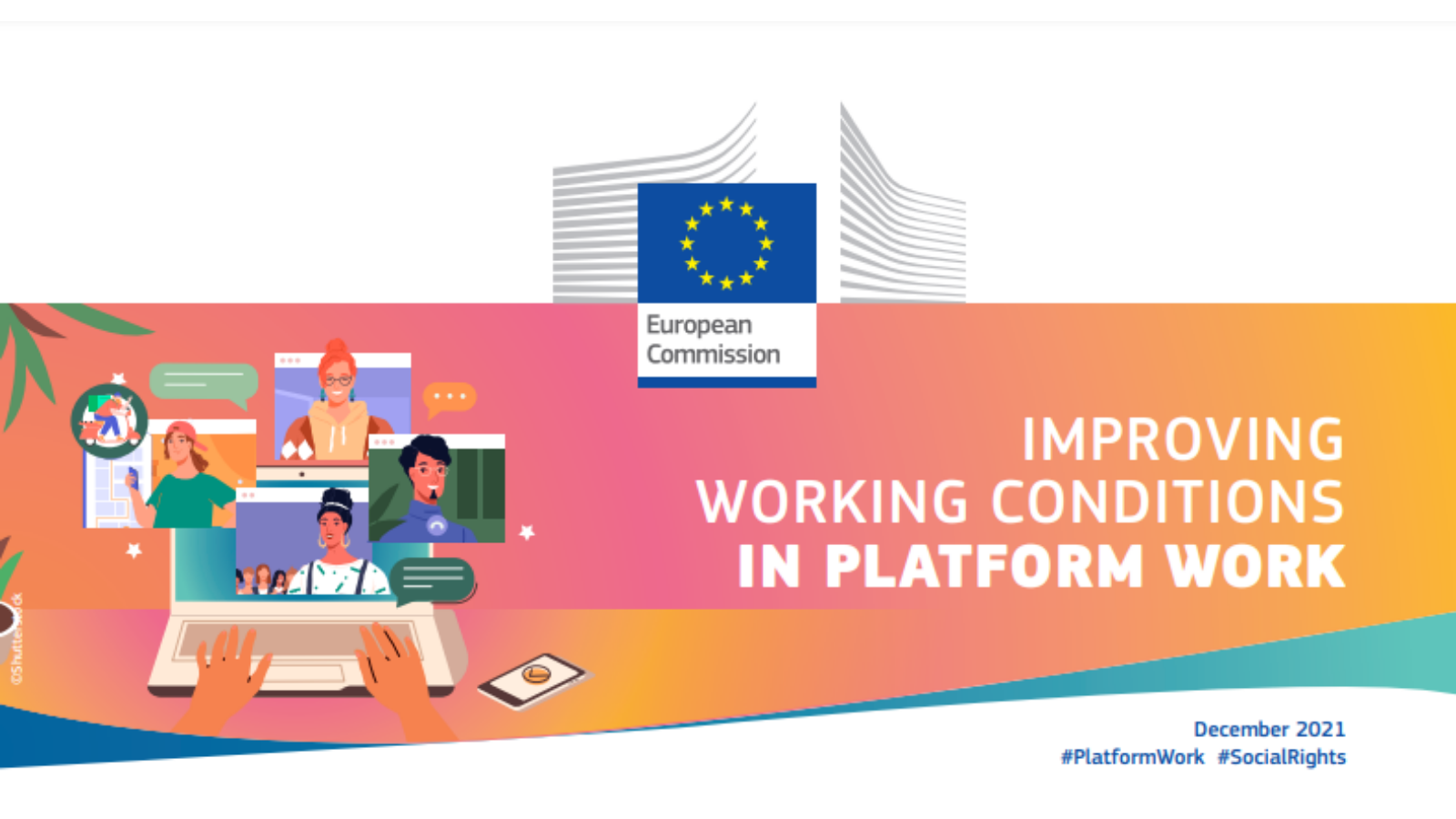
Currently, the EU legislators – the European Parliament and the EU Council – are working on the European Commission’s proposal for a Directive on “Improving working conditions of persons working through digital labour platforms”. The Directive aims to prevent misclassification of platform workers as self-employed (according to the Commission’s estimates, this may concern up to 5.5 million workers); to ensure fairness, transparency and accountability in algorithmic management; and to ensure enforcement of the applicable rules. CECOP strongly supports the declared aims of the Directive. However, we also believe the Commission’s original proposal should be further strengthened in order to ensure decent working conditions and level playing field across platforms, between platforms and other businesses, and across the EU.
CECOP represents enterprises – the cooperative enterprises represented by CECOP provide jobs to 1,3 million workers across Europe active in the fields of industry and services. Yet the cooperative business model fundamentally differs from the capitalist one. Cooperatives are owned and controlled by their members who make decisions democratically, according to the principle ‘one member, one vote’, regardless of the amount of capital they put into the enterprise. CECOP mostly represents worker cooperatives, where workers enjoy all the guarantees and rights associated with being simultaneously workers, and owners of their enterprise. In our network, we also have cooperatives engaged in organization of platform work, including platform cooperatives. Cooperatives have entered the world of the platform work to overcome social disruption linked to emergence of digital platforms, to provide better work conditions to the persons performing platform work, and to put technology at the service of the community. In this position paper, we include several recommendations from the cooperatives’ perspective.
Ensure a level playing field
Level playing field is very important for platforms committed to providing higher work standards, such as cooperative platforms. The Impact Assessment Report, accompanying the Directive, recognizes that “companies based on alternative business models, such as cooperatives, might have opportunities to grow once the playing field were levelled”. Cooperatives owned by workers, who make the decisions regarding the organisation of their work, are great at providing decent working conditions and a high level of job satisfaction. Unfortunately, this is not the case in many capitalistic platforms where workers are heavily subordinated to - and controlled by - the algorithms while being misclassified as self-employed. Therefore, we expect the directive to ensure that the status of persons performing platform work is correctly classified in all cases. The rebuttable presumption of employment should remain as currently mentioned in the directive, and proof of the contrary should be put upon the platform and not the persons performing platform work. This essential for two reasons: first, to address the power and financial imbalance between the person performing platform work and the platform, and secondly, to ensure that decision applies to all persons performing platform work and not only those who have won court cases (as it is currently the case in many countries). The responsible authorities must receive appropriate training and resources, operate proactively, and wield appropriate powers including sanctions, to support the implementation of the directive.
Recognize the benefits of the cooperative model
The Directive should explicitly recognize the benefits of the cooperative model as a solution to improving the conditions of persons performing platform work in the platform economy. Cooperatives involved in the organisation of platform work have the following added value:
- they offer quality working conditions, including respect for occupational safety and health norms; employment status where appropriate, they guarantee access to rights and adequate social protection; training and skill development; and responsible management of persons’ data
- they, by definition, involve their worker-members in democratic control of the enterprise, and in this way, they offer legitimate worker representation
- they help prevent undeclared work and fraud carried out in digital platforms such as the subcontracting of accounts or swapping of accounts
- they involve the local community in the governance (like Consegne Etiche in Bologna) and protect the communities’ interest (the platform cooperative Fairbnb is another example)
- they can serve specific markets of persons that are excluded
- they ensure wealth created is not concentrated in few hands but stays in the community
- they have control over the algorithms that are used to organise the work
- they promote a human-centred digital transition through cooperative control over technology and data ownership
In other words, platform cooperatives provide tangible advantages to all stakeholders concerned by the platforms: persons performing platform work – with quality working conditions and adequate protection, consumers – with transparency, trust, and quality of service, but also regions or states where the platform operates – since they help retain revenues and taxes locally. This contribution of platform cooperatives has already been recognized in the EU Action Plan for Social Economy (December 2021), European Economic and Social Committee’s opinion on “Non-standard employment and platform cooperatives in the digital transformation of industry” (December 2021), and European Parliament’s report “Fair working conditions, rights and social protection for platform workers – New forms of employment linked to digital development” (September 2021). The cooperative model should also be acknowledged in the directive, ensuring that the Member States are aware of its advantages, duly recognize cooperatives in their legislation, and offer necessary support in the framework of enterprise development policies.
Acknowledge that there may be multiple contracting parties
The directive should recognize that multiple contracting parties may be involved in the organisation of platform work and impose appropriate obligations on all of them. Currently, the Commission’s proposal only deals with two parties: the platform, and the persons performing platform work. However, in practice platforms hire persons not only directly, but also via other organisations. In fact, the Commission’s own Impact Assessment Report acknowledges such cases, mentioning the example of France, where “a third operator” could be a cooperative used to provide self-employed working through platforms with the benefits of the employee status.
CECOP believes that the directive must include clear provisions for cases in which multiple contracting parties are involved. Regardless of who specifically engages in contractual relationship with the persons performing platform work, all parties that have a degree of control or supervision over the performance of platform work must be held duly accountable and responsible for ensuring that persons’ rights are guaranteed, and where relevant, national collective agreements are respected. Joining a cooperative can be a solution for freelancers working through platforms, provided that the cooperative principles are respected, namely: voluntary membership and members’ governance and control over the production tool. In any case cooperatives should not be used as a way for platforms to run away from their employers’ responsibilities and duties.
Ensure transparent, fair, and accountable algorithmic management and data ownership
It is necessary to ensure transparency, fairness and accountability in algorithmic management and data ownership, in order to prevent discrimination and abuse of persons’ data. While the Directive already makes welcome steps in this direction, the provisions should be strengthened even further. In the current text of the Directive, there is a missing link between the platform and the algorithm. Technically, the platform and the algorithm may not be in the hands of the same structure, and there could be a decoupling of responsibilities and rights between the two. This could be used by the platforms to avoid their obligations vis-à-vis persons performing platform work. Therefore, it is important to stipulate that “a digital labour platform must have the means to control and modify the algorithmic management it uses”, to ensure that persons performing platform work can hold the platforms accountable and understand the algorithm’s impact on working conditions, and to tackle discrimination and possible abuse of their data. It is also necessary to enlarge the scope of the directive from “automated monitoring and decision-making systems” to all types of algorithmic management, fully or partially automated.
Stronger provisions on algorithmic transparency will help level the playing field between cooperatives and non-cooperative platforms. For platform cooperatives, algorithmic transparency is already an essential part of their business model, given the basic cooperative principles of democratic control by members and concern for community.
Strengthen the rights of persons performing platform work
The directive is one of the key actions of the European Pillar of Social Rights and should be aligned with its principles. In particular, it could go further as to the necessity to protect all persons performing platform work, regardless of the type and duration of their employment relationship. Platforms’ responsibility regarding Occupational Health and Safety Standards and the rights to collective bargaining should be properly addressed regardless of the working status or contract of persons performing platform work. Cooperatives should be acknowledged as offering a suitable framework for legitimate workers’ representation in decision-making. In particular, it is important that legitimate workers’ representatives – which may be cooperative worker-members – have the right not only to be informed about but also to assess the impact of the platform on the health and safety of persons performing platform work and contribute to decisions on appropriate preventive and protective measures, without leaving this responsibility solely to the platforms as the directive currently foresees.
In March 2021, CECOP published a paper addressing the needs of platform workers, and how developing cooperative solutions can challenge the platform economy and to improve working conditions for platform workers. Read it here.

Picture: European Commission







 Employment & Social Inclusion
Employment & Social Inclusion 

